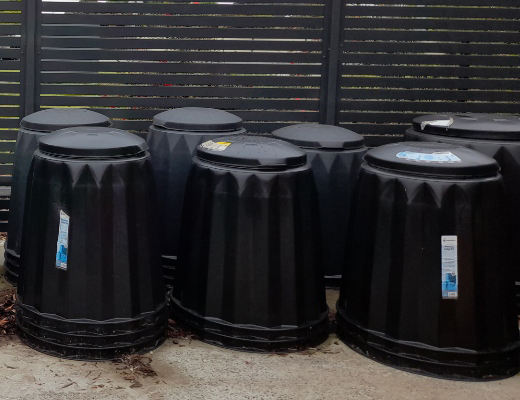How to get a bin
Residents can purchase a compost bin for their home through Council.
Compost bins are available at wholesale prices in two sizes:
- 220L: $49.85
- 400L: $60.00
To order a compost bin, download and complete the Compost Bin Order Form and bring into one of our Customer Hubs at 2 Pope Street, Bannockburn or 19 Heales Street, Smythesdale to collect the bin. If you are unable to download the order form, please call Customer Experience on 5220 7111 to obtain a copy.
If you need help setting up your new compost bin, watch the video below.
Further useful information can be found here.
However it is important to remember that the best food waste is the one that we don’t produce in the first place. For further information on reducing your food waste, visit Sustainability Victoria's website.
- Vegetable and food scraps
- Coffee grounds
- Fallen leaves
- Tea leaves and bags
- Vacuum cleaner dust
- Dead flowers
- Soft stemmed plants
- Torn newspaper
- Animal and human hair
- Egg shells
- Grass Cuttings
- Wood fire ash
- Meat and dairy products
- Metals, plastics, glass
- Diseased plants
- Magazines
- Large branches
- Citrus fruit peels
- Animal fat, bones, droppings from meat eating animals (cats or dogs)
- Weeds that have seeds or underground stems
- Bread, cake or other grain products that may attract mice
- Wash your hands after handling compost or soil materials
- Protect broken skin by wearing gloves
- Avoid confined spaces for handling compost or soil materials
- Keep compost moist to prevent the spores or bacteria in compost from becoming airborne
Vermiculture uses worms to break down food scraps. You can’t use ordinary earthworms as the conditions are too rich. Special earthworms, such as Red, Tiger, Indian Blues and Red Wrigglers thrive in rich and moist conditions of a worm farm.
See this Worm Farm fact sheet for more information.
Chickens are a wonderful way of disposing of household scraps, and they are easy and inexpensive to have at your home. They also create fantastic fertiliser for your garden, help with chemical free bug and weed control, and provide fresh eggs which are great tasting and highly nutritious!
Ballarat Permaculture Guild provides assistance with composting, construction for chook sheds, garden beds and other various structures. View their website here.



